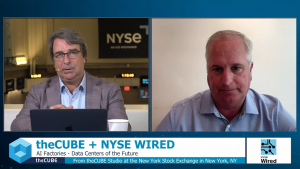 AI
AI
 AI
AI
 AI
AI
Artificial intelligence is spurring a revolution in data centers, and photonics are a part of it.
Silicon photonics is a high-bandwidth alternative to traditional electronic chips. Lightmatter Inc., one of the leaders in this burgeoning space, aims to transform data centers and support the growing AI economy.

Lightmatter’s Steve Klinger talks to theCUBE about photonic computing is powering AI workloads.
“What we’re focused on is unlocking the interconnect bottlenecks in data centers,” said Steve Klinger (pictured), vice president of product at Lightmatter. “Lightmatter is really utilizing silicon photonics to provide much higher bandwidth and also enable much higher connectivity … using light to transmit the data to connect much larger numbers of compute units together … to continue the AI performance scaling.”
Klinger spoke with theCUBE’s John Furrier at theCUBE + NYSE Wired: AI Factories – Data Centers of the Future event, during an exclusive broadcast on theCUBE, SiliconANGLE Media’s livestreaming studio. They discussed how photonic computing powers AI workloads.
AI applications require high-performance computing loads, and silicon photonics have the potential to provide much faster connectivity. While electronic chips aren’t entirely going away, Lightmatter’s Passage optics product could significantly reduce the latency between racks.
“If you look at how most AI data center racks are built today,” Klinger said. “You have copper based connectivity within the racks. Once you go beyond the number of compute units that fit inside the rack, then you’re going to pluggable optics. The trouble is the amount of bandwidth you have there is much lower. So, you’ve created a choke point.”
Lightmatter’s solution is to bring the optics directly to all the chips, transcending the space constraints of a normal rack. This could be a game changer for the GPUs and XPUs that support AI workloads. Lightmatter has also developed technology for protecting the photonic chips in different environments, Klinger explained.
“A lot of the technology that we’ve developed inside of Lightmatter is aimed at not only … implementing the core functionality, but making sure that it’s fully stable, across temperature variations, across other physical disturbances that might occur in the data center,” he added.
Here’s the complete video interview, part of SiliconANGLE’s and theCUBE’s coverage of theCUBE + NYSE Wired: AI Factories – Data Centers of the Future event:
Support our mission to keep content open and free by engaging with theCUBE community. Join theCUBE’s Alumni Trust Network, where technology leaders connect, share intelligence and create opportunities.
Founded by tech visionaries John Furrier and Dave Vellante, SiliconANGLE Media has built a dynamic ecosystem of industry-leading digital media brands that reach 15+ million elite tech professionals. Our new proprietary theCUBE AI Video Cloud is breaking ground in audience interaction, leveraging theCUBEai.com neural network to help technology companies make data-driven decisions and stay at the forefront of industry conversations.